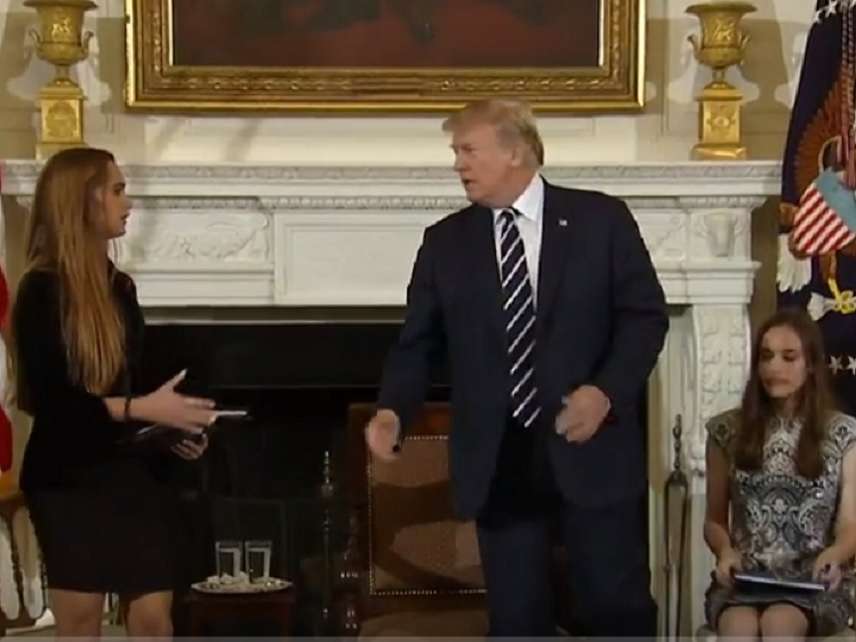Donald Trump's Listening Session With Mass Shooting Survivors Was Really Powerful
The president showed empathy, engagement, and leadership in a way that will surprise many of his critics and supporters alike.

President Donald Trump recently concluded a 90-minute "listening session" with survivors of last week's shooting at Marjory Stoneman Douglas High School in Parkland, Florida. Also attending were parents of children killed in shootings at Columbine High and Sandy Hook Elementary and others who had endured violence in various Washington, D.C.-area schools.
It's worth foregrounding that the exchange was genuinely powerful and often moving as children and parents shared their experiences and losses. Trump listened intently and actively throughout and gave the stage to the guests in attendance at odds with his usual modus operandi. He would follow up on and punctuate points but never felt a need to pull the attention back to himself or egomaniacally insist, as he did on the campaign trail, that he alone can fix problems such as school shootings. After more than a dozen people told their stories, Trump asked, "Does anyone have any idea of how to stop [school shootings]?" He minced no words about shooters, calling them garbage, but he also didn't lose contact with the idea that he was there to listen to and comfort the people in the room, not rail against miscreants. In a word, he was presidential, at least in his bearing and temperament.
In terms of substance and policy, there are clear indicators of where the president will head next. The participants underscored feelings of fear, anger, and resentment at what they saw as indifference from politicians at all levels. Students "need to feel safe," said Jason Gruber, who lived through the Florida shooting. The father of a slain student called for definitive action in a voice suffused with barely controlled rage. Parents of children killed in the Sandy Hook and Columbine shootings emphasized the need to detect mental illness at early stages and to make access to schools more difficult for interlopers. The emphasis throughout was much more on protecting schools rather than stripping weapons per se and a number of respondents talked about the need to arm teachers and staff with weapons. ""If you can't stop it from happening," said one parent, who further noted that hundreds of millions of guns are in circulation, "the challenge becomes to end it as quickly as possible."
The idea of arming teachers and staff is clearly something to which Trump is partial. The typical "attack lasts three minutes," he said at one point, "while it takes five to eight minutes for responders to arrive." He further noted that contemporary schools are often large, sprawling complexes and nodded toward reports that a Stoneman Douglas coach, Aaron Feis, who died shielding students, could have ended the shooting if he'd been carrying his firearm. The president talked about teachers and staff volunteering to carry weapons and undergo training for live-shooting situations. Trump attacked the notion of gun-free school zones and promised to improve and possibly expand background checks. He also pushed the idea that mental illness was the deep cause of mass shootings, especially at schools, and seemed to endorse vague forms of preventive detention if it seemed likely that a given individual might be likely to commit violent crime.
There is plenty to worry about in such responses. Even as she called for more funding for mental-health screening and interventions, the mother of a Sandy Hook victim stressed that most psychologically troubled people are non-violent. Virtually all plans to ban "mentally ill" people from owning guns define the term in such a way that a quarter or more of the population would be included. Such policies are also rife with due-process concerns, which are even more troubling when it comes to anything smacking of preventive detention, including the "gun violence restraining orders" that are gaining popularity among conservatives at National Review and elsewhere. Teachers and staff carrying concealed weapons may be preferable to flooding K-12 schools with yet more police (often euphemistically called "school resource officers"), but schools are already failing under the weight of an ever-growing list of non-academic responsibilities. When it comes to school shootings, virtually all have taken place not simply at public schools but at traditional residential-assignment public schools, especially those with heavy gang activity. Whether public or private, schools of choice tend to have fewer disciplinary and violence problems, so shifting toward choice may be an underappreciated means of reducing school shootings.
If you're in a cynical mood, you might want to consider that focusing on measures such as banning bump stocks, increasing the effectiveness of gun background checks, and expanding resources for mental-health programs are easy ways for Donald Trump to appear presidential while blocking out stories about nasty immigration-reform fights and the ongoing Russia investigation. Whatever the motivation, Donald Trump acted today in a way that will give his detractors pause and his supporters a respite from his less-than-presidential antics.
Here's video of the full discussion:
